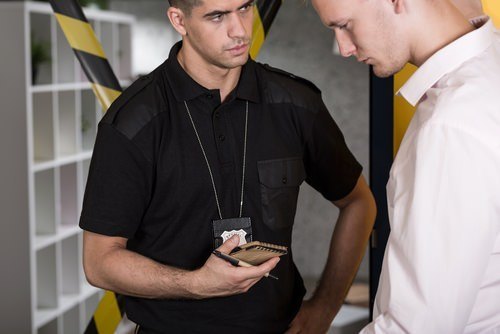Unlawful police detention is when law enforcement, without legal justification, restricts your freedom to leave. Doing so constitutes a civil rights violation based on the Fourth Amendment. That amendment to the U.S. Constitution prohibits officers from conducting unreasonable searches or seizures.
A police detention is a seizure of your person. If it is unreasonable, it violates your Fourth Amendment rights. If it violates the Fourth Amendment, it is unlawful.
In this article, our police misconduct attorneys explain:
- 1. What constitutes a police “detention”?
- 2. What are consensual police encounters?
- 3. What are Terry stops or stop-and-frisks?
- 4. Is a traffic stop a detention?
- 5. When does a detention become an arrest?
- 6. How can a detention be unlawful?
- 7. Do lawful detentions have a time limit?
- 8. What remedies can I get after an unlawful detention?

A police detention is unreasonable if it violates your Fourth Amendment rights
1. What constitutes a police “detention”?
A police detention happens when an officer temporarily takes away your freedom to leave. It is different from an arrest. Arrests happen when a police officer places you in custody. Detentions are less intrusive than an arrest.
Not all encounters with the police are considered detentions. There is a spectrum of police encounters. They range from:
- purely consensual police encounters,
- short detentions that are limited in scope, like stop-and-frisks,
- traffic stops, and
- official arrests.
Example: A law enforcement officer sees three people who look like they are planning to rob a store. He approaches them and asks for their names. They refuse to respond and the officer detains them by stopping and frisking them. He finds a gun on two of them. He arrests both of them.1
Law enforcement officers infringe more on your rights as they move from a consensual encounter toward an arrest. Each step requires additional justification.
2. What are consensual police encounters?
Purely consensual police encounters are not detentions. You are free to leave if you choose. Law enforcement officers generally do not need reasonable suspicion or probable cause to initiate a consensual encounter. They do not need a reason to talk to you in public.2
Example: A law enforcement officer approaches someone on the sidewalk. He asks if they would mind answering a few questions about a recent shoplifting offense in the area.
3. What are Terry stops or stop-and-frisks?
Terry stops are brief detentions. It often takes the form of a stop-and-frisk. Police can initiate a Terry stop whenever they have a reasonable suspicion that a crime is happening.3 You are not free to leave during the stop.
However, the police search is limited in scope. Police are only allowed to search for a weapon by stopping and frisking you. The detention can only last for a short duration.
While Terry stops or stop-and-frisks are not consensual, they are not arrests, either. Police do not need probable cause to conduct one.
Example: A patrol officer sees a man loitering around a store for an hour, waiting for it to close. The officer stops and frisks him, suspicious that the man is about to commit a robbery.
4. Is a traffic stop a detention?
Traffic stops are similar to Terry stops. They amount to a detention because you (the driver or passenger) are not free to leave. Police can also initiate one if they have a reasonable suspicion that a crime or traffic infraction has occurred. The traffic stop has to be short, though.
It cannot take longer than necessary to resolve the suspected infraction. The officer can, however, use that time to notice evidence of other crimes.4
Example: A traffic officer sees a car veer into another lane before correcting. The officer pulls the car over to ticket the driver for an unsafe lane change. While talking to the driver, the officer looks for signs of intoxication.
5. When does detention become an arrest?
Arrests are when law enforcement officers take you into custody for violating criminal law. This usually means applying restraints such as handcuffs and transporting you to a police station or jail. The law enforcement officers are permitted conduct a full search of you incident to the arrest.
That search is not limited in scope. Officers can only make an arrest if they have probable cause to believe that a crime has occurred. Otherwise, they engage in a false arrest.5
Example: A peace officer sees one man punch another man outside a bar. He arrests the man who threw the punch for assault.
6. How can a detention be unlawful?
Law enforcement can make an unlawful detention whenever they violate your Fourth Amendment rights. This can happen if officers:
- lie to a judge to get a search warrant or an arrest warrant,
- excessive use of force during an arrest,
- do not have a reasonable belief it is necessary to detain you,
- do not have probable cause to make an arrest, or
- detain you for an excessively long period of time.6
7. Do lawful detentions have a time limit?
The length of the detention has to be reasonable, given the context. The length is determined by the reason for the detention.7
Detentions can only last as long as it takes to determine whether you have committed a crime. This applies to both traffic stops and Terry stops. Continuing to detain you without evidence of a crime can be unlawful.
Example: A car veers into another lane and gets pulled over. There is no evidence of drug trafficking. However, the officer wants to bring a drug-sniffing dog to the stop. He writes the driver a ticket for the illegal lane change. The officer tells the driver he cannot leave until the dog arrives.8
Sometimes, the law enforcement officer does find evidence of a crime. In those cases, the length of the detention can grow.
8. What remedies can I get after unlawful detention?
As a victim of an unlawful police detention, you can pursue 4 types of remedies under federal or state law:
- You can file a complaint against the police officer,
- You can file a motion to exclude whatever evidence of a crime the officer found during the detention,
- You can file a federal or state lawsuit for an injunction, and
- You can file a federal or state lawsuit against the officer and the department for monetary damages.9
Filing a complaint with the police department can lead to repercussions against the police officer. In egregious cases, the officer can get fired. They can also be suspended or reprimanded.
If you were subsequently charged with a crime, you can file an exclusionary motion. That motion would ask the court to exclude evidence discovered because of the detention.
If the motion is successful, the court will prevent evidence tainted by the unlawful detention from being used in court. Without the evidence of a crime from the detention, prosecutors often have to drop the charges.
You can also file a lawsuit. That lawsuit can be filed:
- in state court, using state civil rights laws, or
- in federal court, using the federal civil rights law 42 U.S.C. § 1983.
The lawsuit can demand:
- an injunction, asking the court to force the police department to take a particular action, and/or
- monetary damages.
Injunctions in civil rights cases over unlawful police detentions can aim to fix the source of the violation. For example, they can:
- force the law enforcement department to change its arrest policies,
- require local police to undergo additional training, or
- move certain law enforcement officers into roles that do not interact with the public.
Civil rights lawsuits can also demand monetary damages as part of an unlawful detention lawsuit. These damages aim to compensate you for the police misconduct.
The compensation aims to cover your damages, including your:
- medical expenses for personal injury (such as from excessive force),
- lost wages,
- reduced earning capacity from the long-term effects of your injuries,
- damage to your reputation from the arrest,
- physical pain and emotional suffering for the human rights violation, and
- loss of liberty from the unlawful detention, a form of presumed damages.
Courts can also award you punitive damages. Punitive damages are meant to punish the law enforcement officer for especially wrongful conduct. It can also be assessed against a municipality or police department for having an unlawful arrest policy.

Contact our law firm for help and legal advice.
Legal Authorities:
- Terry v. Ohio (1968) 392 U.S. 1.
- See, for example, People v. Renteria (9th Cir., 1993) 12 F.3d 1110.
- Terry v. Ohio, Supra. Note that shopkeepers usually have a privilege that allows them to temporarily detain suspected shoplifters.
- See Arizona v. Johnson (2009) .
- See United States v. Bravo (9th Cir., 2002) 295 F.3d 1002.
- Illinois v. Caballes (2005) 543 U.S. Supreme Court 405. See also California Penal Code 835 PC.
- Rodriguez v. United States (2015) 135 S. Ct. 1609.
- See note 6.
